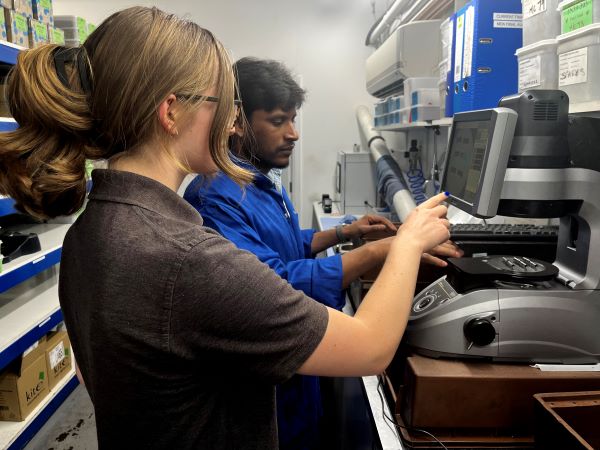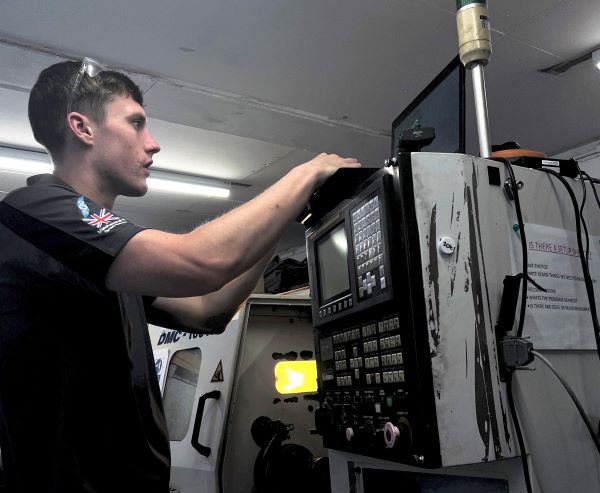Last month a UK workforce report by EngineeringUK revealed that around a fifth (19.2%) of the UK workforce were working in an engineering and technology occupation in 2023.
The report, which provided a breakdown of the workforce by characteristics including age, gender and ethnicity, found marked gender differences and showed that women remain significantly underrepresented in both engineering and technology. In fact, the percentage of women in engineering dropped from 16.5% in 2022 to 15.7% in 2023.
Over the summer thousands of students have had to decide as to whether to continue their education and many will have considered T-levels as their next move in their education.
Introduced by the last UK government in 2020, these two-year courses combine study with career experience and are vocational qualifications, that are aimed at 16-to-19-year-olds, and tend to focus more on practical subjects than academic ones.
The qualification includes a mixture of both classroom learning and on-the-job experience, with a work placement of at least 315 hours - or about nine weeks - making up roughly 20% of the course.
T-levels are considered as an alternative to A-levels and are intended for students who do not wish to take an apprenticeship, which usually requires as much as 80% of a student's time to be spent with an employer. Grades are based on a mixture of exams, coursework and completion of the industry placement.
However, over the past few year pass rates have fallen. In 2024 the overall pass rate for the 7,262 students who got their grades was 88.7%, down from 90.5% in 2023, while dropout rates remained high. The latest figures show that 71% of the 10,253 students starting in 2022 finished their course compared to 90% of A-level students.
Each T-level is seen as being equivalent to 3 A Levels and aims to help students better develop their skills and knowledge as well as to experience the workplace through an industry placement, which can be developed in collaboration with employers and education providers helping students to enter skilled employment, an apprenticeship or related technical study through further or higher education.
According to the Gatsby Charitable Foundation, which was established by Lord Sainsbury to support a variety of different causes, including education, the most successful international skills systems have three things in common: simplicity, national standards, and stability. So, creating a clear, effective framework for technical education is essential not only for helping young people achieve social mobility but also for ensuring businesses can access the skilled workforce they need to thrive.
With T-levels employers can offer industry placements as a block, day release or a mix of these, and can discuss sharing part of the placement with another employer if necessary. Employers can also get support when offering placements such as assistance with paperwork, a careful planning process and support with designing the industry placement.

Above and main image: Amber Smith had a work placement with Quantamatic as part of her t-level studies
Recruitment struggles
As EngineeringUK’s survey showed, the sector needs to see a much stronger pipeline of female talent coming through and T-levels are seen, by some, as a great entry point.
Quantamatic, a manufacturing business based in Leicestershire, employs 35 people and designs and manufactures a range of components for the electronics industry, among others.
The company has struggled to recruit the right technical talent, so when the company heard about T-levels in Engineering and Manufacturing, they wanted to explore them. The Engineering and Manufacturing T-levels have seen an 80% increase in enrolment from year 1 to year 2.
Francis Wilkinson, Quantamatic’s Quality and Regulatory Manager, said, “It was our local college that told us about T-levels and asked if we’d consider taking a student for a work placement. When we saw Amber Smith’s CV, we were keen to meet her.”
Smith was halfway through her first year studying for a Design and Development for Engineering and Manufacturing T-level qualification when she was offered a 45-day work placement at Quantamatic.
“To say it’s been a success, is an understatement,” said Wiliknson. “She completely exceeded our expectations, bringing a new dimension to the business”.
Smith’s CAD skills stood out, enabling her to create new drawings for Quantamatic that are now being used across the business. “Some of our product designs were certainly dated,” said Wilkinson, “and Amber applied the skills she’d learned at college and elevated our core drawings to a new level. She made a huge, tangible difference and leaves a real legacy”.
According to Wilkinson, Smith gained transferable skills during her placement that will be useful for her future career, such as how to prioritise and meet deadlines. He was impressed by how she adapted to the working world.
“I really would encourage other SMEs in the manufacturing space to take on a T-level student,” concluded Wilkinson, “With a bit of time invested up-front, you’ll reap the rewards soon afterwards. Make sure you understand the student’s interest and their technical specialism and if you can match that to the needs of your business, you’ll be winning.”
Hosting a T-level student worked so well for the company that it has already lined up another student to start their placement and as Quantamatic’s experience shows, the student’s school or college will support companies at every stage explaining your responsibilities and will support you with practicalities like health and safety, insurance and risk assessments.
T-levels are seen by many as a great opportunity to bring a young person into a workplace permanently and to build a pipeline of talent.
Talent pipeline
‘We only have 6 employees, so recruitment risk is high for us,” said Jamie Clare, the Director at Iconic Engineering Solutions, a small firm of six employees based in Grantham, Lincolnshire. “T-levels mitigate this risk and really allow us to test the talent to see if they are a good fit for the business.”
A mechanical engineering business using their own 3D CAD software to produce technical drawings, the company manages projects across a range of sectors but with deep experience in the automotive industry. They then manufacture components using state of the art CNC machining centres in their factory.
“When Iconic was growing as a business, I realised how bad the pipeline of engineering talent was - there just weren’t enough skilled people coming through. Apprenticeships were created to help with this, but the drop-out rates can sometimes mean they are a risky investment,” explained Clare.
“I thought T-levels sounded like a good solution – the student gets the technical knowledge from the classroom combined with a decent stint in a business.”
Clare believes it’s important to give engineering and manufacturing students hands-on experience and to show how the business operates from the inside. “Engineering and manufacturing aren’t topics you can learn about in the classroom alone; you need practical application too. For a small business like ours, the recruitment risk is magnified; T-levels help mitigate this. For me, it’s like a safety net which allows me to see if the student is suited to the role and the business before we employ them fully.”
Because the student has the technical knowledge of the sector from their studies, they can almost hit the ground running, unlike work experience students.
“I’d encourage engineering businesses of all sizes to give T-levels a go - you’ll reap the rewards quickly,” said Clare.

Above: T-levels help to mitigate the risk when it comes to recruitment
Concerns to be addressed
These examples certainly demonstrate some success with T-levels, but critics have pointed to the high levels of drop-out and inappropriate industry placements.
The education watchdog Ofsted found that at their best, T-levels combined high-quality study and practical skills development. However, many courses were not what students expected, and many felt that they had been misled about their content.
“As with many new qualifications, there are some teething issues, but in most cases, providers and employers seem to be working well together to address them,” said His Majesty’s chief inspector, Amanda Spielman. “We did see shortcomings which providers and the Department for Education (DfE) will want to address. But, when done well, T-levels can be a strong option for learners who prefer a vocational route through education as a path to their intended career. But that does require extensive engagement with employers as part of a well-considered curriculum planning process”.
Results from the class of 2024 show that 89% of students passed their T-level qualification, and nearly all students (95%) completed their 45-day industry placement. Year-on-year improvements in retention and assessment rates are encouraging, although, as T-levels continue to be rolled out and the cohort sizes remain smaller compared to other qualifications, it’s important to approach the data with some caution.
The Gatsby Foundation, in partnership with key engineering and manufacturing industry bodies is working with employers to integrate T-levels effectively into their businesses, ensuring a future-ready workforce.
Some providers were hesitant about T-levels because they expect other vocational courses to be stripped of funding under DfE reforms. The previous government had planned to withdraw funding for BTecs before effective evaluation and the roll-out of T-levels, and many providers struggled to recruit and retain staff with enough experience and expertise.
Finding suitable placements is a barrier to increasing the number of T-level places available and placements are often limited and for students who completed T-level courses and went on to study for degrees at university, many found that their preferred university did not accept T-levels as an entry qualification.
To address that problem there is a real need to raise public awareness and promote the qualifications to employers. Funding to support providers and ensure T-level delivery is available and can be used to help businesses offer industry placements.
According to Chloe Franklin, Marketing and Communications Manager, EngineeringUK, “If you’re a small business in engineering and technology, you will realise just how important it is to have a skilled and motivated workforce. That's where T-levels come in. They are specifically designed to address skills needs. The curriculum is up-to-date and relevant and engineering employers of all sizes have had an input.
“They can help to unlock young talent and are attracting a high calibre of students, not only that but they are reducing training costs too, so small businesses don't have to spend as much time and money on recruiting and training.”
T-levels should be viewed as a vital part of the future of engineering, technology and manufacturing in the UK. Aligned with industry standards, they’re high quality and are rigorously tested. Students learn a wide range of skills, including producing and interpreting drawings, building models and simulations using CAD software, quality control, fault finding, and risk assessments.
The new Labour government is backing T-levels and is committed to ensuring that publicly-funded technical qualifications have direct links to national occupational standards – a key principle of the 2016 Independent Panel Review on Technical Education.
Over the last four years, T-levels have risen in popularity and more employers are benefitting from highly motivated new starters who have had nine weeks of hands-on experience and completed the industry-backed qualifications.
By joining the growing number of businesses taking part and supporting T-levels, businesses can play an active role in helping secure the future of engineering in the UK.













